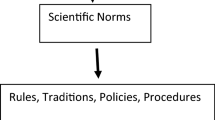Abstract
My aim in this paper is to rebut objections that have been made of the account of the various roles for values in scientific activities that I have developed, initially in my book Is Science Value Free?, in response to criticizing the proposal that science is value free. Specifically I respond to objections that my account does not recognize the significance of basic science, and that my defense of the ideal of impartiality cannot be sustained.
Similar content being viewed by others
Notes
When "value(s)" is unqualified it substitutes for "ethical, social and other non-cognitive value(s)."
"Theory" is used in a broad sense to include, in addition to (those) theories with the logico-mathematical structures much discussed by philosophers of science, also systematically organized bodies of empirically based claims.
Sometimes neutrality is taken to be the view—"cognitive neutrality" [CN] (Lacey and Mariconda 2012)—that claims, held in accordance with I, have no value judgments among their entailments. CN represents a logical thesis, not an epistemological or ethical ideal. Accepting CN does not imply upholding N.
The notion of “strategy” was introduced in Lacey (1999).
E.g., systematic effects of social change; interactions and processes of the components of sustainable agroecosystems (Lacey 2015c); consequences (harmful effects and risks) of introducing applications into social practices that are occasioned by socioeconomic mechanisms; and conditions for effective measures to protect public health in impoverished areas. Moreover, explaining human action, including engaging in scientific research using DSs, requires the use of intentional categories.
Hypotheses investigated under DSs have no value judgments among their entailments; adopting DSs ensures that CN (see Note 5) is satisfied. Insofar as SVF identifies neutrality with CN, it implicitly takes for granted that scientific research must proceed under DSs. But CN does not imply N.
"DS [CS]-research" stands for "research conducted under DSs[CSs]," "DS[CS]-knowledge" for "knowledge obtained in research conducted under DSs[CSs]," "DS-theories" for "theories deployed under DSs," etc.
For clarification of "scientific risk investigations," and discussion of their strengths and limitations in the case of GMOs, see Lacey (2017b).
Here I draw extensively on Douglas (2009)—although she does not use the term "endorse," and rejects the way in which I distinguish between endorsement and holding in accordance with I.
For a brief discussion of what constitutes well made endorsements and the strategies (DSs and CSs) that need to be adopted so that they are properly informed by the results of scientific investigations, see Lacey (2015a).
Fruitfulness and comprehensiveness may be interpreted in the light of social values—certainly comprehensiveness is often interpreted in the light of commitment to using DSs. This may introduce ambiguities in the notion of basic research.
Upholding materialist metaphysics has often motivated attempts to seek explanations in DS-theories of phenomena (e.g., human action) that normally are explained using intentional, value and other categories that have no place under DSs. RVS allows a legitimate place for such research in the context of multi-strategic research. Without CS-research also being conducted on these phenomena, it would not be possible to test whether or not DS-theories can match or exceed the relevant CS-theories (of these phenomena) in empirical adequacy, explanatory power, and capacity to anticipate future possibilities.
SVF represents my attempt to explicate an outlook that has been influential throughout the modern scientific tradition, whereas, according to Douglas (2009), svf is intended to represent an ideal that has been defended in discussions that originated with Rudner’s well known article, "The scientist, qua scientist, makes value judgments" (Rudner 1953).
References
Douglas H (2009) Science, policy, and the value-free ideal. University of Pittsburgh Press, Pittsburgh
Elliott KC (2017) A tapestry of values: an introduction to values in science. Oxford University Press, New York
Kourany J (2010) Philosophy of science after feminism. Oxford University Press, New York
Lacey H (1999) Is science value free? values and scientific understanding. Routledge, London
Lacey H (2005a) Values and objectivity in science: current controversy about transgenic crops. Lexington Books, Lanham
Lacey H (2005b) On the interplay of the cognitive and the social in scientific practices. Philos Sci 72:977–988
Lacey H (2013) Rehabilitating neutrality. Philos Stud 162:77–83
Lacey H (2014a) Tecnociência comercialmente orientada ou pesquisa multiestratégica? Sci Stud 14:669–695
Lacey H (2014b) Fact/value dichotomy. In: Britt Holbrook J, Mitcham C (eds) Ethics, science, technology, and engineering: a global resource, 2nd edn, vol 2. Macmillan Reference USA, Detroit, pp 223–226
Lacey H (2015a) “Holding” and “endorsing” claims in the course of scientific activities. Stud Hist Philos Sci 53:89–95
Lacey H (2015b) Food and agricultural systems for the future: science, emancipation and human flourishing. J Crit Realism 14:272–286
Lacey H (2015c) Agroécologie: La science et les valeurs de la justice sociale, de la démocratie et de la durabilité. Ecol Polit 51(2015):27–40
Lacey H (2016) Science, respect for nature, and human well-being: democratic values and the responsibilities of scientists today.”. Found Sci 21:883–914
Lacey H (2017a) Distinguishing between cognitive and social values. In: Elliott K, Steel D (eds) Current controversies of values in science. Routledge, New York, pp 15–30
Lacey H (2017b) The safety of using genetically engineered organism: empirical evidence and value judgments. Public Aff Q 31:259–279
Lacey H, Mariconda PR (2012) The eagle and the starlings: Galileo’s argument for the autonomy of science. Stud Hist Philos Sci 43:122–131
Lacey H, Mariconda PR (2014) O modelo das interações entre as atividades científicas e os valores. Sci Stud 14:643–668
Longino HE (2008) Values, heuristics and the politics of knowledge. In: Howard D, Kourany J, Carrier M (eds) The challenge of the social and the pressure of practice. University of Pittsburgh Press, Pittsburgh, pp 68–86
Rudner R (1953) The scientist qua scientist makes value judgments. Philos Sci 20:1–6
Author information
Authors and Affiliations
Corresponding author
Rights and permissions
About this article
Cite this article
Lacey, H. Roles for Values in Scientific Activities. Axiomathes 28, 603–618 (2018). https://doi.org/10.1007/s10516-018-9386-2
Received:
Accepted:
Published:
Issue Date:
DOI: https://doi.org/10.1007/s10516-018-9386-2




